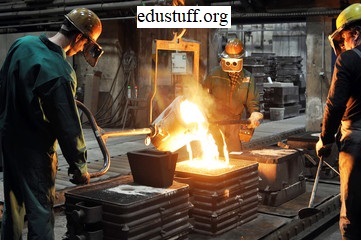
Career Opportunities Cast Industry: Exploring the Career Opportunities
Career Opportunities Cast Industry: Exploring the Career Opportunities
The cast industry plays a vital role in manufacturing and construction, providing essential components for various sectors. As the demand for cast products continues to rise, so do the career opportunities within this industry. In this blog post, we will delve into the diverse career paths available in the cast industry and explore the exciting possibilities for professionals seeking rewarding and dynamic careers.
Understanding the Cast Industry
The cast industry involves a manufacturing process called casting, which entails pouring liquid material, such as metal or plastic, into a mold to obtain a desired shape. This mold is then cooled or solidified to create a solid object. Casting processes can vary, including methods like sand casting (using sand molds), investment casting (using wax patterns), and die casting (using metal dies). Each casting process has its unique applications and benefits.
Cast products are widely used across industries for their versatility and strength. In the automotive industry, cast components are found in engines, transmissions, and suspension systems. In aerospace, cast parts are vital for aircraft engines, landing gears, and structural components. The energy sector relies on cast products for turbines, generators, and pipes. Even the architecture and construction fields utilize cast products for decorative elements, structural support, and artistic features. Cast products offer exceptional properties such as high strength, dimensional accuracy, and the ability to create complex shapes.
Career Paths in the Cast Industry
Casting Technician: Casting technicians are responsible for preparing molds, selecting suitable materials, and ensuring the quality of cast products. They work with various casting techniques and equipment to create molds, pour molten materials, and remove finished castings. Attention to detail, knowledge of materials and casting processes, and the ability to follow precise instructions are essential skills for casting technicians. Vocational training programs and certifications are available to enhance their expertise in this field.
Foundry Engineer: Foundry engineers are involved in the design, optimization, and troubleshooting of casting processes. They analyze the technical aspects of casting operations, such as mold design, material selection, and process parameters, to improve efficiency and quality. These professionals work closely with casting technicians and collaborate with other engineers to ensure the production of high-quality castings. Foundry engineers typically hold bachelor’s or master’s degrees in metallurgical or materials engineering, which provide a strong foundation in materials science and engineering principles.
Quality Control Specialist: Quality control plays a crucial role in the cast industry to ensure that cast products meet specified standards. Quality control specialists employ various inspection methods, perform tests, and analyze data to identify any defects or deviations in the casting process. They work closely with casting technicians, foundry engineers, and other team members to implement corrective measures and ensure adherence to quality requirements. Attention to detail, strong analytical skills, and knowledge of quality management systems are vital for this role.
Research and Development: Research and development professionals in the cast industry focus on innovation and improvement in casting processes and materials. They explore new techniques, experiment with different alloys or composites, and develop advanced manufacturing methods to enhance casting efficiency, reduce costs, and improve product performance. A background in materials science, engineering, or a related field is crucial for those interested in R&D within the cast industry. These professionals collaborate with academic institutions, industry partners, and other stakeholders to drive innovation and push the boundaries of casting technology.
Read Also:
What are Careers?: The Power of Strategic Career Planning
What are Career Aspirations: Shaping Your Path to Success
Career Objectives on a Resume: Path to Success
Emerging Trends and Future Opportunities
Additive Manufacturing (3D Printing): Additive manufacturing, or 3D printing, has emerged as a transformative technology in the cast industry. It allows the creation of complex and intricate cast products with reduced lead times and material waste. Professionals with expertise in additive manufacturing techniques, knowledge of materials and their properties, and proficiency in computer-aided design (CAD) software have significant opportunities in this rapidly evolving field. They can work on designing and optimizing 3D-printed molds, exploring new materials for additive casting, and integrating additive manufacturing processes into traditional casting methods.
Sustainable Casting: The cast industry is increasingly focused on sustainability, aiming to reduce waste, improve energy efficiency, and implement environmentally friendly practices. Professionals in this area contribute by developing and implementing sustainable casting processes, optimizing material usage, and exploring recycling methods for cast products. Careers in sustainable casting require a deep understanding of environmental regulations, waste reduction strategies, and materials science. These professionals work on developing casting methods that minimize material waste, reduce energy consumption, and incorporate recycled or eco-friendly materials.
Automation and Robotics: Automation and robotics are revolutionizing casting processes, enhancing productivity, precision, and safety. Professionals skilled in operating, programming, and maintaining automated casting systems are in high demand. They ensure the smooth operation of robotic systems, monitor production parameters, troubleshoot issues, and optimize the efficiency of automated casting lines. Strong technical aptitude, programming knowledge, and familiarity with robotic systems are valuable assets for individuals pursuing careers in automation within the cast industry.
Conclusion
The cast industry offers a wide range of career opportunities for individuals interested in manufacturing, engineering, quality control, research, and innovation. From casting technicians and foundry engineers to quality control specialists and R&D professionals, the cast industry welcomes individuals with diverse skill sets and educational backgrounds.
Moreover, emerging trends such as additive manufacturing, sustainable casting, and automation present exciting avenues for growth and specialization. Professionals who embrace these technologies and develop expertise in areas like 3D printing, environmental sustainability, and robotics will find themselves at the forefront of innovation in the cast industry.
To pursue a career in the cast industry, individuals can explore vocational training programs, obtain relevant certifications, or pursue higher education in materials science, engineering, or related fields. Continuous learning, staying updated with industry advancements, and acquiring hands-on experience will be crucial for success in this dynamic field.
As the demand for cast products continues to rise across various sectors, the cast industry offers excellent prospects for professionals seeking challenging and rewarding careers. Whether it’s shaping the future of casting through research and development or ensuring the highest quality standards as a quality control specialist, the cast industry is a field ripe with opportunities for those with a passion for innovation, problem-solving, and manufacturing excellence.






